The induction effect. Why the rebound effect is only half the story of technology’s failure to achieve sustainability.
 The concept of the rebound effect is important in understanding the limits to how much technological efficiency improvements can reduce energy and resource consumption. However, the rebound effect is only half of the story. This article by Steffen Lange, Tilman Santarius and his research team, published in the Journal Frontiers in Sustainability, presents the term ‘induction effect’ to grasp additional important mechanisms stemming from new technologies. The article defines the induction effect empirically grounds it by way of three case studies in the fields of online consumption, smart homes, and pace of life. The article shows that including both rebound and induction effects helps better understand the relationship between technological change and the environment.
The concept of the rebound effect is important in understanding the limits to how much technological efficiency improvements can reduce energy and resource consumption. However, the rebound effect is only half of the story. This article by Steffen Lange, Tilman Santarius and his research team, published in the Journal Frontiers in Sustainability, presents the term ‘induction effect’ to grasp additional important mechanisms stemming from new technologies. The article defines the induction effect empirically grounds it by way of three case studies in the fields of online consumption, smart homes, and pace of life. The article shows that including both rebound and induction effects helps better understand the relationship between technological change and the environment.
Rebound Effect and Sustainability Science: A Review.
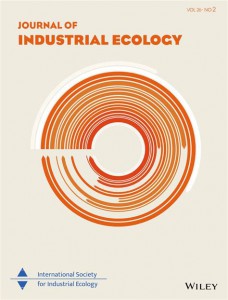 Rebound effects have been historically studied through narrow framings which may overlook the complexity of sustainability challenges. This article by David Font Vivanco, Tilman Santarius and five other international co-authors in the Journal of Industrial Ecology presents a critical literature review of rebound effects in the context of sustainability science in order to (1) map existing rebound research which goes beyond mainstream approaches, (2) unveil and classify current knowledge gaps in relation to sustainability science, (3) outline a research agenda, and (4) provide a knowledge base to support the design of effective policies toward sustainable development. We suggest that this knowledge is crucial for promoting a prioritization of actions and a concrete transition toward sustainability.
Rebound effects have been historically studied through narrow framings which may overlook the complexity of sustainability challenges. This article by David Font Vivanco, Tilman Santarius and five other international co-authors in the Journal of Industrial Ecology presents a critical literature review of rebound effects in the context of sustainability science in order to (1) map existing rebound research which goes beyond mainstream approaches, (2) unveil and classify current knowledge gaps in relation to sustainability science, (3) outline a research agenda, and (4) provide a knowledge base to support the design of effective policies toward sustainable development. We suggest that this knowledge is crucial for promoting a prioritization of actions and a concrete transition toward sustainability.
Nudging Sustainable Consumption: A Large-Scale Data Analysis of Sustainability Labels for Fashion in German Online Retail.
 A transition toward a sustainable way of living is more pressing than ever. How do online retailers provide information on the sustainability of products to consumers? This article by Maike Gossen, Tilman Santarius and further team members in the journal Frontiers in Sustainability is based on a large-scale dataset we built by using AI methods, and which contains sustainability information of nearly 17,000 fashion products of leading online retailers in Germany. We find that only 14% of the tagged products present credible third-party verified sustainability labels. Hence, we strongly recommend political initiatives that tackle the risk of greenwashing resulting from uncertified and weak sustainability information in e-commerce.
A transition toward a sustainable way of living is more pressing than ever. How do online retailers provide information on the sustainability of products to consumers? This article by Maike Gossen, Tilman Santarius and further team members in the journal Frontiers in Sustainability is based on a large-scale dataset we built by using AI methods, and which contains sustainability information of nearly 17,000 fashion products of leading online retailers in Germany. We find that only 14% of the tagged products present credible third-party verified sustainability labels. Hence, we strongly recommend political initiatives that tackle the risk of greenwashing resulting from uncertified and weak sustainability information in e-commerce.
The Jevons Paradox Unravelled: A Multi-Level Typology of Rebound Effects and Mechanisms.
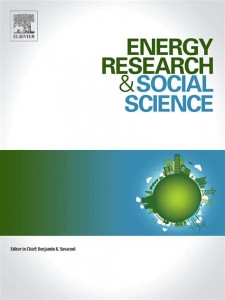 This article, written by Steffen Lange, Tilman Santarius and further colleagues in the Journal of Energy Research & Social Science, develops a novel typology for the analyses of the rebound effect. It presents a typology that introduces an important differentiation between the rebound mechanisms which generate changes in energy consumption, and the size of such changes, called rebound effects. The typology is populated with eighteen rebound mechanisms from the literature. This innovative and robust rebound typology aims to establish common conceptual ground for future research on the rebound phenomenon and for developing rebound mitigation policies.
This article, written by Steffen Lange, Tilman Santarius and further colleagues in the Journal of Energy Research & Social Science, develops a novel typology for the analyses of the rebound effect. It presents a typology that introduces an important differentiation between the rebound mechanisms which generate changes in energy consumption, and the size of such changes, called rebound effects. The typology is populated with eighteen rebound mechanisms from the literature. This innovative and robust rebound typology aims to establish common conceptual ground for future research on the rebound phenomenon and for developing rebound mitigation policies.
Digital Sufficiency: Conceptual Considerations for ICTs on a Finite Planet.
 Information and Communication Technologies hold significant potential to increase resource and energy efficiencies and contribute to a circular economy. This article by Tilman Santarius and 9 others international authors in the Annals of Telecommunications for the first time develops the concept of Digital Sufficiency, which constitutes a basis to understand how ICT can become part of a deep sustainability transformation. The conceptual work builds on five years of multidisciplinary empirical and theoretical work on digitalization and sustainability. The article manifests four dimensions of Digital sufficiency – hardware sufficiency, software sufficiency, user sufficiency, and economic sufficiency – and presents a set of strategies and policy proposals for each.
Information and Communication Technologies hold significant potential to increase resource and energy efficiencies and contribute to a circular economy. This article by Tilman Santarius and 9 others international authors in the Annals of Telecommunications for the first time develops the concept of Digital Sufficiency, which constitutes a basis to understand how ICT can become part of a deep sustainability transformation. The conceptual work builds on five years of multidisciplinary empirical and theoretical work on digitalization and sustainability. The article manifests four dimensions of Digital sufficiency – hardware sufficiency, software sufficiency, user sufficiency, and economic sufficiency – and presents a set of strategies and policy proposals for each.
Corporate Strategy and the Theory of the Firm in the Digital Age: Reintroducing a Normative Perspective.
 The theory of the firm, as we know it from the literature, focuses on the boundary question. Recently, the question how firms can adequately response to the ongoing trend of digitalization hast been discussed. What is missing in the extant literature, however, is a reflection on the normative question of what role business firms should or could play in tackling major (“grand”) challenges such as climate change, poverty, migration, and rising inequality. This article by Dodo zu Knyphausen-Aufseß and Tilman Santarius in the Journal of Corporate & Business Strategy Review provides guideline for future theorizing about business firms along the three cornerstones (de-) growth, sustainability, and digitalization.
The theory of the firm, as we know it from the literature, focuses on the boundary question. Recently, the question how firms can adequately response to the ongoing trend of digitalization hast been discussed. What is missing in the extant literature, however, is a reflection on the normative question of what role business firms should or could play in tackling major (“grand”) challenges such as climate change, poverty, migration, and rising inequality. This article by Dodo zu Knyphausen-Aufseß and Tilman Santarius in the Journal of Corporate & Business Strategy Review provides guideline for future theorizing about business firms along the three cornerstones (de-) growth, sustainability, and digitalization.
Digitalization and the Decoupling Debate. Can ICT help to reduce environmental impacts while the economy keeps growing?
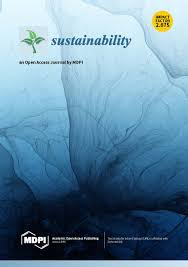 Digitalization can increase resource and energy productivities. However, the production and usage of ICT require materials and energy, and the application of ICT fosters economic growth. This article by Tilman Santarius, Johanna Pohl and Steffen Lange in the Journal Sustainability examines whether digitalization helps or hinders an absolute decoupling of environmental throughput from economic growth. The paper combines the literature on “green IT” and “ICT for green” with studies on the relationship between economic growth, technological change, and environmental throughput. Comparing the mitigating and the aggravating impacts of digitalization, we conclude that a more active political and societal shaping of the process of digitalization is needed to make ICT work for a sufficient absolute decoupling.
Digitalization can increase resource and energy productivities. However, the production and usage of ICT require materials and energy, and the application of ICT fosters economic growth. This article by Tilman Santarius, Johanna Pohl and Steffen Lange in the Journal Sustainability examines whether digitalization helps or hinders an absolute decoupling of environmental throughput from economic growth. The paper combines the literature on “green IT” and “ICT for green” with studies on the relationship between economic growth, technological change, and environmental throughput. Comparing the mitigating and the aggravating impacts of digitalization, we conclude that a more active political and societal shaping of the process of digitalization is needed to make ICT work for a sufficient absolute decoupling.
From Unidisciplinary to Multidisciplinary Rebound Research: Lessons Learned for Comprehensive Climate and Energy Policies
 This article presents how the rebound phenomenon has evolved from only being considered from a neoclassical economic perspective to include several other disciplines such as psychology, sociology, and industrial ecology. It discusses lessons learned from multidisciplinary rebound research for policies and measures that aim to mitigate rebound effects. The main finding of this article by Tilman Santarius, Hans Jakob Walnum and Carlo Aall in the Journal Frontiers in Energy Research is: If policymakers aim to make climate and energy policies as “rebound-proof” as possible, findings from both energy economics and multidisciplinary rebound research have to be taken into account.
This article presents how the rebound phenomenon has evolved from only being considered from a neoclassical economic perspective to include several other disciplines such as psychology, sociology, and industrial ecology. It discusses lessons learned from multidisciplinary rebound research for policies and measures that aim to mitigate rebound effects. The main finding of this article by Tilman Santarius, Hans Jakob Walnum and Carlo Aall in the Journal Frontiers in Energy Research is: If policymakers aim to make climate and energy policies as “rebound-proof” as possible, findings from both energy economics and multidisciplinary rebound research have to be taken into account.
Rethinking Climate and Energy Policies.
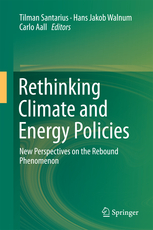 This volume, edited by Tilman Santarius, Hans Jakob Walnum and Carlo Aall, suggests rethinking current climate, energy and sustainability policy-making by presenting new insights into the rebound phenomenon. It offers new aspects in rebound economics, but then explores multidisciplinary perspectives on the phenomenon. The volume puts rebounds into praxis and presents several policy cases and sector-specific approaches, including labour markets, urban planning, tourism, information and communication technologies, and transport. It finally embeds the issue into the larger debate on decoupling, green growth and degrowth, and sketches out lessons learned for sustainable development strategies and policies at large.
This volume, edited by Tilman Santarius, Hans Jakob Walnum and Carlo Aall, suggests rethinking current climate, energy and sustainability policy-making by presenting new insights into the rebound phenomenon. It offers new aspects in rebound economics, but then explores multidisciplinary perspectives on the phenomenon. The volume puts rebounds into praxis and presents several policy cases and sector-specific approaches, including labour markets, urban planning, tourism, information and communication technologies, and transport. It finally embeds the issue into the larger debate on decoupling, green growth and degrowth, and sketches out lessons learned for sustainable development strategies and policies at large.
Energy efficiency, human behavior, and economic growth
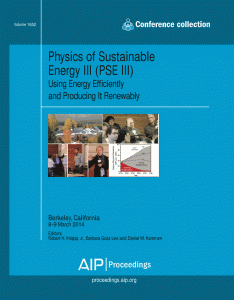 Increasing energy efficiency in households, transportation, industries, and services is an important strategy to reduce energy service demand to levels that allow the steep reduction of greenhouse gases. Yet, technological efficiency improvements may generate so-called rebound effects, which may ‘eat up’ parts of the technical savings potential. This chapter in the “Physics for Sustainable Energy II conference proceedings” provides a comprehensive review of existing research on these effects, raises critiques, and points out open questions. As a rough “rule of thumb”, about half the savings potential of energy efficiency improvements may be ‚eaten up’ by rebound effects.
Increasing energy efficiency in households, transportation, industries, and services is an important strategy to reduce energy service demand to levels that allow the steep reduction of greenhouse gases. Yet, technological efficiency improvements may generate so-called rebound effects, which may ‘eat up’ parts of the technical savings potential. This chapter in the “Physics for Sustainable Energy II conference proceedings” provides a comprehensive review of existing research on these effects, raises critiques, and points out open questions. As a rough “rule of thumb”, about half the savings potential of energy efficiency improvements may be ‚eaten up’ by rebound effects.
Economy of Sufficiency
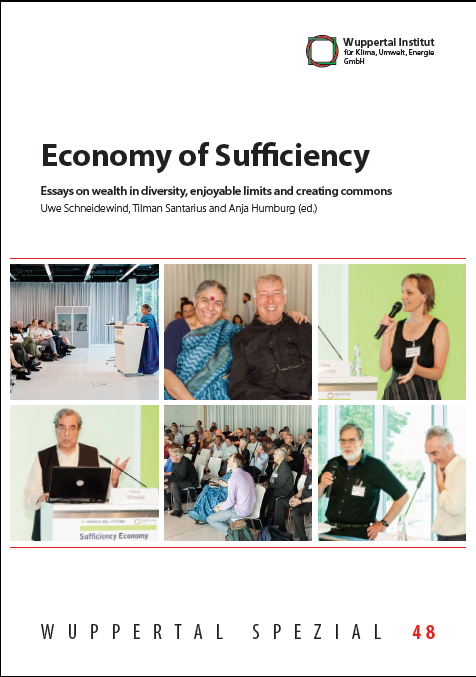 Can we conceive an economy, and respective economic institutions, that serve human needs and wealth without a built-in necessity to grow? This question has been addressed by a symposium in honor of Wolfgang Sachs. Uwe Schneidewind, Tilman Santarius and Anja Humbug edit the main contributions to this symposium in the reader Economy of Sufficiency – Essays on wealth in diversity, enjoyable limits, and creating commons. The essays by Ashok Khosla, Marianne Gronemeyer, Vandana Shiva, Richard Norgaard, Tim Jackson, Ezio Manzini and Silke Helfrich indicate the historical development of the ideas on a sufficiency economy and display an intellectual ‘tour de raison’ through discourses of sustainable development of the past several decades.
Can we conceive an economy, and respective economic institutions, that serve human needs and wealth without a built-in necessity to grow? This question has been addressed by a symposium in honor of Wolfgang Sachs. Uwe Schneidewind, Tilman Santarius and Anja Humbug edit the main contributions to this symposium in the reader Economy of Sufficiency – Essays on wealth in diversity, enjoyable limits, and creating commons. The essays by Ashok Khosla, Marianne Gronemeyer, Vandana Shiva, Richard Norgaard, Tim Jackson, Ezio Manzini and Silke Helfrich indicate the historical development of the ideas on a sufficiency economy and display an intellectual ‘tour de raison’ through discourses of sustainable development of the past several decades.
Green Growth Unravelled
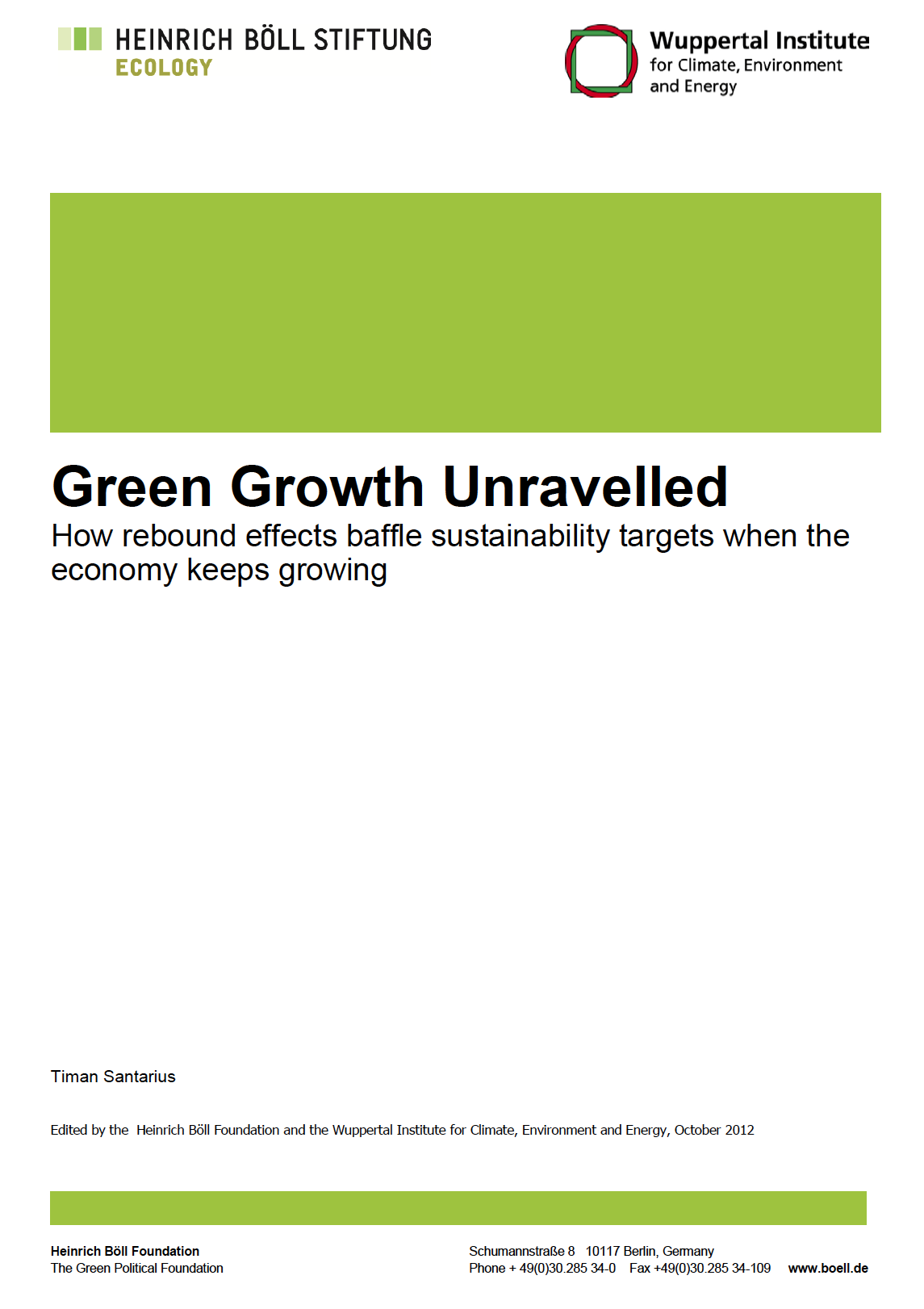 Can energy consumption and emissions be reduced greatly, while the economy continue to grow? This study by Tilman Santarius goes to the question of how energy efficiency measures generate so-called rebound effects that increase energy consumption and, thus, run counter to the goal of energy conservation. It describes a variety of possible rebound effects and analyzes the challenges to address rebound with environmental policies. The conclusion: only if the economy stops growing, can natural consumption be reduced sufficiently.
Can energy consumption and emissions be reduced greatly, while the economy continue to grow? This study by Tilman Santarius goes to the question of how energy efficiency measures generate so-called rebound effects that increase energy consumption and, thus, run counter to the goal of energy conservation. It describes a variety of possible rebound effects and analyzes the challenges to address rebound with environmental policies. The conclusion: only if the economy stops growing, can natural consumption be reduced sufficiently.
Climate and Trade – An Introduction to Issues of Conflict and Convergence
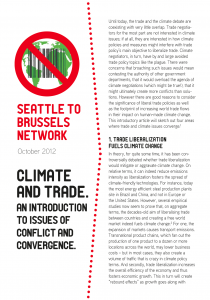 Until today, the trade and the climate debate are coexisting with very little overlap. Trade negotiators for the most part are not interested in climate issues; if at all, they are interested in how climate policies and measures might interfere with trade policy’s main objective to liberalize trade. Climate negotiators, in turn, have by and large avoided trade policy topics like the plague. However there are good reasons to consider the significance of liberal trade policies as well as the footprint of increasing world trade flows in their impact on human-made climate change. This introductory article, published in a reader of the Seattle to Brussels network, will sketch out four areas where trade and climate issues converge.
Until today, the trade and the climate debate are coexisting with very little overlap. Trade negotiators for the most part are not interested in climate issues; if at all, they are interested in how climate policies and measures might interfere with trade policy’s main objective to liberalize trade. Climate negotiators, in turn, have by and large avoided trade policy topics like the plague. However there are good reasons to consider the significance of liberal trade policies as well as the footprint of increasing world trade flows in their impact on human-made climate change. This introductory article, published in a reader of the Seattle to Brussels network, will sketch out four areas where trade and climate issues converge.
North South Transitions to Green Economies
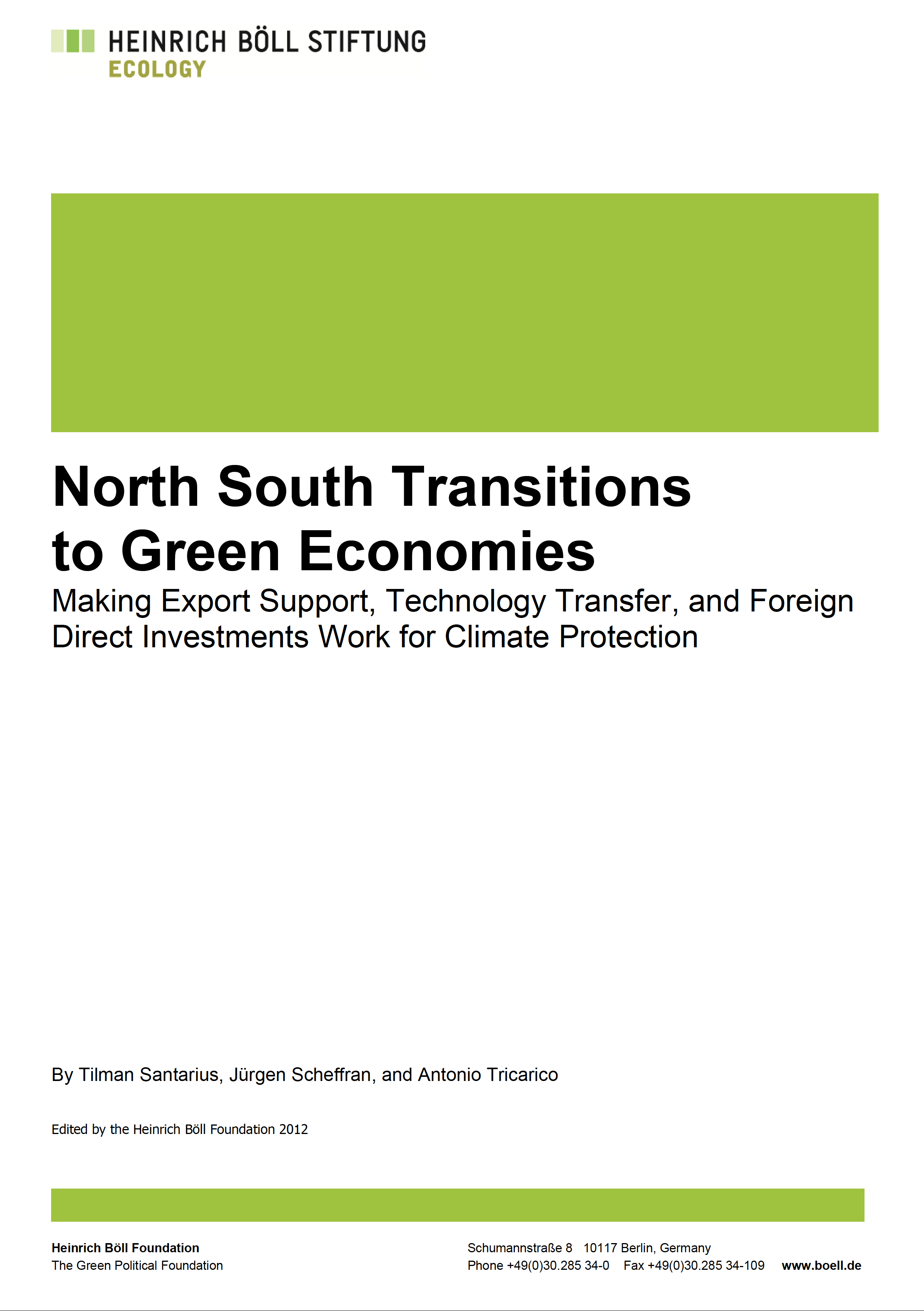 At the UN Conference on Sustainable Development “Rio plus 20″, green economy was one of the key topics on the agenda. But the ambitions of the final declaration of the summit was rather modest. This study by Tilman Santarius, Jürgen Scheffran and Antonio Tricarico proposes reforms in the global North and South, so that the worldwide transformation to renewable energies may succeed in an ecologically and socially sustainable way. Proposals are made for political governance of investments in the countries of the South, as well as for innovative reforms to promote sustainable exports from the North.
At the UN Conference on Sustainable Development “Rio plus 20″, green economy was one of the key topics on the agenda. But the ambitions of the final declaration of the summit was rather modest. This study by Tilman Santarius, Jürgen Scheffran and Antonio Tricarico proposes reforms in the global North and South, so that the worldwide transformation to renewable energies may succeed in an ecologically and socially sustainable way. Proposals are made for political governance of investments in the countries of the South, as well as for innovative reforms to promote sustainable exports from the North.
Balancing Trade and Environment
 If at all, environmental protection and sustainability play a subordinate role in the policies of the World Trade Organization (WTO). The growing incompatibility of a liberalized world trade with the protection of the biosphere is one of the biggest challenges for global governance in the 21st Century. One part of the study by Tilman Santarius and colleagues addresses the areas of conflict between environmental and trade law, and examines potential solutions. Another part discusses the instrument of Strategic Impact Assessment with regard to its suitability to incorporate environmental issues systematically in policy-making processes of the WTO. Download the study “Balancing Trade and Environment” here.
If at all, environmental protection and sustainability play a subordinate role in the policies of the World Trade Organization (WTO). The growing incompatibility of a liberalized world trade with the protection of the biosphere is one of the biggest challenges for global governance in the 21st Century. One part of the study by Tilman Santarius and colleagues addresses the areas of conflict between environmental and trade law, and examines potential solutions. Another part discusses the instrument of Strategic Impact Assessment with regard to its suitability to incorporate environmental issues systematically in policy-making processes of the WTO. Download the study “Balancing Trade and Environment” here.
Attitudes of German Companies towards an Emissions Trading Scheme
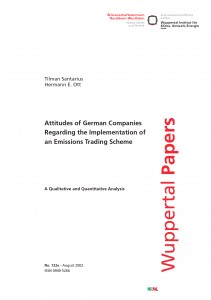 In 2001 and 2002, the introduction of the EU emissions trading scheme was in full swing.The BDI and some business organizations in Brussels and Berlin had lobbied strongly against the instrument, arguing that this would run counter to national industry interests. Yet, as this survey shows, most of the companies in Germany did not even understand the basic functioning of the instrument. However, the BDI and some business organizations in Brussels and Berlin had lobbied strongly against the instrument – apparently uninformed of the fact that German industry would include a European comparison of the winners of the EU emissions trading. Click here for a download of the study “Attitudes of German Companies Regarding the Implementation of an Emissions Trading Scheme“ by Tilman Santarius and Hermann E. Ott.
In 2001 and 2002, the introduction of the EU emissions trading scheme was in full swing.The BDI and some business organizations in Brussels and Berlin had lobbied strongly against the instrument, arguing that this would run counter to national industry interests. Yet, as this survey shows, most of the companies in Germany did not even understand the basic functioning of the instrument. However, the BDI and some business organizations in Brussels and Berlin had lobbied strongly against the instrument – apparently uninformed of the fact that German industry would include a European comparison of the winners of the EU emissions trading. Click here for a download of the study “Attitudes of German Companies Regarding the Implementation of an Emissions Trading Scheme“ by Tilman Santarius and Hermann E. Ott.